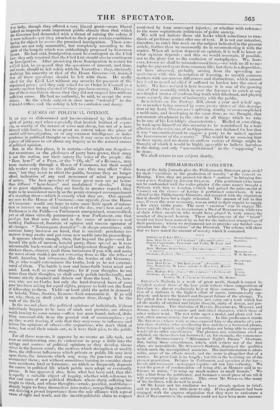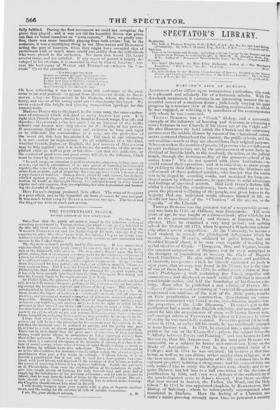PHILHARMONIC CONCERTS.
Sous of the daily journals give the Philharmonic Directors great credit for their " exertions in the production of novelty " at the concert on Monday. First, they are praised for their "_exertion" in bringing for- ward a new Sinfonia by JosEen STRAUSS. This gentleman (who must not be confounded with the waltz-grinder the same name) brought a Sinfonia with him to London, (which had gained the prize-medal at Vienna) on the chance of having it performed somewhere. It was offered to the Philharmonic .Directors, and accepted with the stipulation that it should have but a single rehearsal. The amount of toil in this ease, if even this were necessary, was an order to their copyist to supply a few extra violist parts. The next " exertion" was to engage Mr. LISZT and Mr. OLE flt.u. to caricature a Duet of BEETHOVEN, while two of their fellow members, who would have rlalled it, were among the number of disgusted hearers. These achievements of the " board" would not have been noticed by us but for the indiscreet trumpetings of their partisans; whom we recommend not to provoke any further exa- mination into the " exertions" of the Directors. The scheme will show that we have stated the amount of novelty which it contained.
RIT t.
Slat/Ilia in E lint (MA) JOSEI'll STRAUSS. lborr " 0 Val,rlatid" (Feraami . SPONTINI. • cotrrtante, Pialia,o, and M. LiszT and 0'.!: I;■•0 13Exinia.EN. Aria. Mall:11110 DoIll'■ Gass, " En ,ain Yesp:-ro J,• MEYEIITIFER.
t tl Pocisina W. S. IISENNETT•
ACV II.
• in 11 il.rt . BEET/WV/M.
Aria. 1 krr Ei,nr " Her E " LisiT Ki.ies 31,,s,- he , .31•Irche
1.1szT. lb m
• abm• non, ; , " I. enrance" Ser mod) n. :;k; tA: Overto, %did', V/ I,
Ixadel'. Mr. F. nroirn—Conductur, Mr. Enmor.
STIlArss'S Sinfonia is a work of great merit, though it cannot be weighed against those of the four great writers whose compositions of this class we almost exclusively hear at these concerts. The produc- tion of a sinfonia is the highest effort of music, instrumentally em- ployed; and hence the hazard and frequent failure of the attempt. To the gilled few it belongs to conceive and carry out a work which has all the marks of original and bright thought,. unity of design. and per- fect mechanism. The sinSmias of 11 1 1 ox, BEETHOVEN, MOZART, and Smile, have each a separate mad individual character, which those of other writers want. The rest write upon a model, and glean and bor- row, often unconsciously, but of necessity. In this predicament stands Mc'. STne uss ; whose work at once exposed hint to the attacks of a cer- tain elass critics, who recollecting here and there a borrowed phrase, have 1'i:stolid upon it, neglecting (or perhaps not being able to compre- lpntl) all its other excellencies. The phrases, too, sometimes cited as original, are themselves but borrowed ; as, for example, the commence- ment of Mi:Noesssonx's "Midsummer Night's Dreamt" Overture. But, bating these coincidences, which, with writers not of the first class. are unavoidable, Mr. STRAUSS'S Sinfonia displayed the qualities which mark the accomplished musician. His instrumentation is admi- rable, some of its of novel ; and the score is altogether that of a master. Its great fault is its leugth ; but this is the besetting sin of the preseat generation. Debates in Parliament and speeches at the bar— novels and romances--newspaper reports—all run into verbosity. We NV.Ili1 the power of condensation—of heing able, as MORLEY said in re- ference to music, " to wrap up much matter in small bounds," We take a hint from the goldbeater, and hammer a small piece of ore till it will overspread a large surfisce. This error Mr. STRAUSS, like many of his brethren, will do well to avoid.
Of Mr. LiszT and his coadjutor we have already spoken in brief; mid in truth, we have little snore to add. If two performers had been engaged with the express stipulation that they were to caricature a that of BEETHOVEN'S, the condition could not have been more success-
fully fulfilled. During the first movement we could not recognize the piece they played ; and it was not till the beautiful theme. was given out that we found ourselves on "terra cognita," Here, we gladly con- fess, there was some beautiful playing from both artists; but, to the audience, it was a mortifying thing to see MOSelIELES and IlLsonovn acting the part of listeners, when they might have occupied that of performers with so much more credit and ability than the individuals who were placed in the orchestra. We have now heard Mr. Lorer several times, and are satisfied. If any organ of genins is largely de- veloped in his cranium, it is eeeeeded in sise by that of humbug ; wit- ness his burlesques of Weaten and BEE:1110e ilx—witness his " re- citals" (!) on the pianoforte.
" Tot the capricloas town
Bestow as hAti011 pruMpIS ; ivt Out Muse alto at least pietta,ce 're the: es.,t ems, of item, ee, to Ow ream, and tt ty KtIt't-v."1,..!■11' 11". "tI Oh how refreshing it was to turn flout this cerieatare of the great artist to his real portrait—to appeal from Beeerito vex drunk to Beier- HOVEN .t:I■tr—to Beeernovee in his Sinfoein, Where the freshness, fancy, and vigour of his young mind are sT abundantly displayed. We never enjoyed this brig lit and glowing. composition (perhaps for this reason) more.
Madame Doers Gass displayed, in the same song, the same exuber-
ance of ornament which deliahted so molly heamss last year. It is right that French singers should be heard in French songs, if at all; and therefore MAYEUBEER (who has sunk i:to an imitator of the Gallic school) and AunEn were fitly ehm.en cm. the display of her powers. If unmeaning flights of arpeggio:: foul cadences so long and rapid as to obliterate the remembrancer
o. :.tub, are the perfection of the vocal art, this lady has attained it. But such in our estimation it is not—rather its degradation. To all exhibitions of a like kind, whether French, Italian. or English, the just censure of METAsT.ssio may he fitly applied : and it is well to cite the authority of this accom- plished critic as well as poet at this time—not that any authority or the control of good taste and good sense, will abate the nuisance, which must he cured by its own extravagance-
" Ill such songs, no attention is paid to character, situation, fleeting, sense or reason ; and metely ostentatious of its own power of imitating instillment:a rapidity, the voice of the singer is able to commulticate only the pleasure which arises from surprise, and of acquit lug the same applause which is bestowed on a rote-dancer or tumIthr. Modern mu=le, elated liv such success, has daringly rebelled against poetry, and neglecting ;di true expression. and regarding at- tention to words as tloivnr. lit sloven:, loss indulged herself in every kind of caprice and extravagance, thus accon4ishing her own degradation and hasten- ing the downfal of the °pew."
Herr Eicnies singing produced little effect. The song of SVOyfINI is a poor affair, and to the beautiful air front .Tessonde he was unequal. It was much better sung by lisise a season or two ago. The band and the singer too were at sixes and sevens.



























 Previous page
Previous page